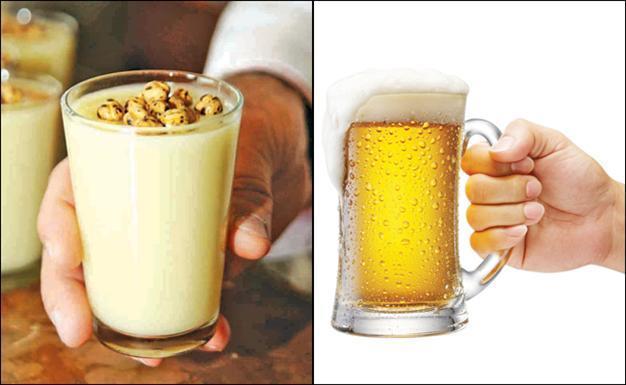Debate heats up on alcohol-free beer
ISTANBUL - Hürriyet Daily News

Boza, the traditional malt drink (L), contains more alcohol than the alcohol-free beers, which is fingerpointed by Muharrem Balcı, of Yeşilay.
Alcohol-free beer is a trap set for children by liquor producers, said Muharrem Balcı, the head of Yeşilay (Turkish Green Crescent), a Turkish association combating drug abuse and alcoholism, yesterday.“Liquor producers target the youth to increase their market share and alcohol consumption and therefore come up with various tactics to lower the age to start drinking alcohol. One of them is the ‘alcohol-free beer’ hoax,” he said.
A result of a test carried out by a laboratory tied to the Food, Agriculture and Livestock Ministry for the association showed those beverages contain 0.26 percent alcohol, Balcı said. However, the found-out result is about half the rate of the standard the ministry sets for the alcohol-free beers and way lower than the traditional fermented dairy beverages.
Alcoholic strength of alcohol-free beers cannot exceed 0.5 percent, according to the standards laid out in the food codex issued by the ministry, said Dr. Dilara Nilüfer Erdil of the Department of Food Engineering at Istanbul Technical University. The limits are even higher when it comes to fermented traditional drinks such as boza, kımız and kefir. The limits vary between 0.6 and 1.5 percent.
The alcohol limit set for kefir particularly is 1.1 percent. Kefir is a fermented milk drink made with kefir grains.
Boza has been a popular malt drink made from maize for centuries from the Balkans to Central Asia. Likewise, boza has been mass produced and marketed throughout the country recently.
“Although [the rate of alcohol in alcohol-free beer] is under the legal limit, [the amount] is very significant,” Balcı said, adding that the Institution of Forensic Medicine put forth that a 0.20 percent alcohol rise in human blood raises the fatal traffic accident risk by twofold.
However, the amounts of alcohol in alcohol-free beers and fermented dairy products would not likely result in such a rise of alcohol in human blood, Erdil said. Alcohol in those beverages is not added but rather is a result of fermentation during the production process, she added. Also, the alcohol is not completely absorbed in the body.
















